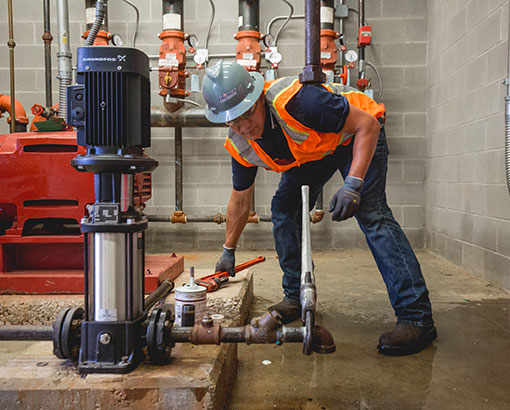Cutting-Edge Water Filtration Systems: Promoting Healthier Living Settings
Cutting-Edge Water Filtration Systems: Promoting Healthier Living Settings
Blog Article
Recognizing the Key Elements of Effective Water Filtration Systems

Relevance of Water Filtration Solution
Water filtering systems play an important role in making sure access to tidy and secure drinking water by properly removing contaminations and pollutants. These systems are necessary in resolving the growing problems over water high quality and the possible health threats related to eating polluted water. By using different filtration mechanisms such as reverse osmosis, turned on carbon, and UV sterilization, water filtering systems can effectively eliminate dangerous substances like microorganisms, viruses, heavy metals, and chemicals from the water.
Additionally, water filtration systems assist to improve the taste and odor of water by removing chlorine, debris, and other contaminants that can affect its high quality. Well Pump Replacement. This improvement in water top quality not only makes it more tasty yet likewise encourages people to consume alcohol a sufficient quantity of water daily, advertising much better hydration and overall wellness
Types of Filtering Parts

Physical filters are developed to literally stress out pollutants from the water. These filters can be made from materials like ceramic, carbon, or perhaps sand, and they function by capturing bits bigger than the filter's pores as water travels through.
Chemical filters use different chemical procedures to get rid of impurities from the water. Instances include activated carbon filters, which adsorb contaminations, and turn around osmosis membrane layers, which use stress to different contaminants from the water.
Organic filters make use of living microorganisms like algae or microorganisms to damage down natural matter and toxins in the water. These filters are usually used in wastewater treatment plants or natural water filtration systems.
Understanding the various types of filtering elements is crucial for picking the most ideal water purification system for particular filtration requirements.
Feature of Debris Filters
Debris filters play a crucial duty in water filtering systems by efficiently recording strong fragments suspended in the water. These filters are typically the first line of defense why not try here in a filtration system, eliminating bigger particles such as sand, silt, dirt, and rust prior to the water relocates via finer filtering phases. By capturing these debris, the filters prevent them from getting to downstream parts, hence prolonging the life-span and effectiveness of the entire system.
Overlooking this maintenance can lead to clogging, lowered water flow, and compromised filtration effectiveness. Generally, sediment filters are essential parts that contribute dramatically to the efficiency of water purification systems.
Duty of Turned On Carbon Filters
Playing a critical function in water filtering systems, triggered carbon filters contribute in getting rid of impurities and impurities from the water supply. These filters are developed to adsorb and catch a wide variety of toxins, including chlorine, unstable natural substances (VOCs), pesticides, and herbicides. The triggered carbon material has a large area, permitting for the reliable trapping of contaminants via a procedure called adsorption. As water travels through the filter, the triggered carbon brings in and holds onto the contaminations, making certain that the water that appears on the various other side is cleaner and much safer for usage.
Triggered carbon filters are very efficient at enhancing the taste and smell of water by reducing chemicals that can influence its high quality. They are additionally capable of eliminating particular heavy steels like lead and mercury. In addition, these filters can assist prevent the accumulation of germs and algae in water, further boosting its overall high quality. Due to their convenience and integrity, activated carbon filters are a crucial part in guaranteeing that water is cleansed to the greatest criteria before getting to customers.
Understanding Reverse Osmosis Solutions
Reverse osmosis Continued systems are advanced water purification systems that use an innovative procedure to remove impurities and impurities from drinking water. These systems work by using pressure to the water, compeling it via a semi-permeable membrane layer.
Furthermore, reverse osmosis systems are fairly low-maintenance and can be mounted under the sink or in a main purification system, supplying practical accessibility to clean water throughout the home. Overall, understanding exactly how reverse osmosis systems work can assist individuals make informed decisions concerning their water purification needs.
Verdict
Finally, efficient water purification systems are important for guaranteeing safe and tidy drinking water. The vital elements of these systems consist of debris filters, turned on carbon filters, and turn around osmosis systems. By comprehending the function and role of each part, individuals can make informed decisions when picking a water purification system. It is click over here important to focus on the high quality of water in order to promote general wellness and well-being.
Water filtration systems play an important duty in ensuring accessibility to safe and clean drinking water by successfully removing contaminants and contaminations. By using different filtering mechanisms such as reverse osmosis, turned on carbon, and UV sterilization, water filtration systems can efficiently get rid of dangerous compounds like germs, infections, heavy metals, and chemicals from the water supply.
Sediment filters play an essential function in water filtration systems by successfully capturing strong particles put on hold in the water (Water Softeners).Playing a critical duty in water purification systems, triggered carbon filters are instrumental in eliminating contaminations and contaminants from the water supply.Reverse osmosis systems are innovative water purification systems that use a sophisticated process to eliminate pollutants and impurities from alcohol consumption water
Report this page